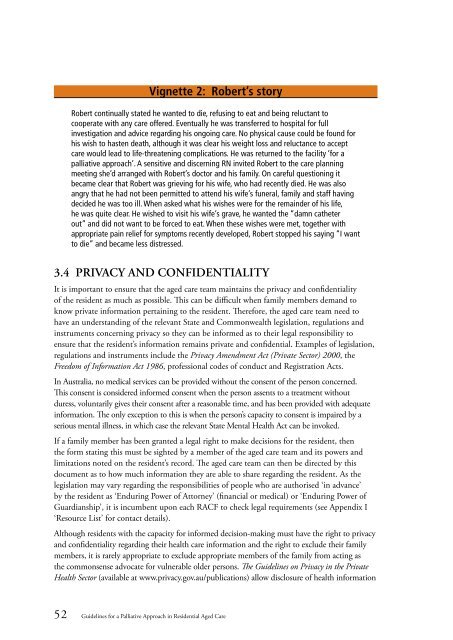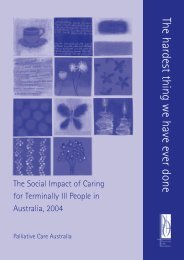Guidelines for a Palliative Approach in Residential Aged Care
Guidelines for a Palliative Approach in Residential Aged Care
Guidelines for a Palliative Approach in Residential Aged Care
You also want an ePaper? Increase the reach of your titles
YUMPU automatically turns print PDFs into web optimized ePapers that Google loves.
Vignette 2: Robert’s story<br />
Robert cont<strong>in</strong>ually stated he wanted to die, refus<strong>in</strong>g to eat and be<strong>in</strong>g reluctant to<br />
cooperate with any care offered. Eventually he was transferred to hospital <strong>for</strong> full<br />
<strong>in</strong>vestigation and advice regard<strong>in</strong>g his ongo<strong>in</strong>g care. No physical cause could be found <strong>for</strong><br />
his wish to hasten death, although it was clear his weight loss and reluctance to accept<br />
care would lead to life-threaten<strong>in</strong>g complications. He was returned to the facility ‘<strong>for</strong> a<br />
palliative approach’. A sensitive and discern<strong>in</strong>g RN <strong>in</strong>vited Robert to the care plann<strong>in</strong>g<br />
meet<strong>in</strong>g she’d arranged with Robert’s doctor and his family. On careful question<strong>in</strong>g it<br />
became clear that Robert was griev<strong>in</strong>g <strong>for</strong> his wife, who had recently died. He was also<br />
angry that he had not been permitted to attend his wife’s funeral, family and staff hav<strong>in</strong>g<br />
decided he was too ill. When asked what his wishes were <strong>for</strong> the rema<strong>in</strong>der of his life,<br />
he was quite clear. He wished to visit his wife’s grave, he wanted the “damn catheter<br />
out” and did not want to be <strong>for</strong>ced to eat. When these wishes were met, together with<br />
appropriate pa<strong>in</strong> relief <strong>for</strong> symptoms recently developed, Robert stopped his say<strong>in</strong>g “I want<br />
to die” and became less distressed.<br />
3.4 PRIVACY AND CONFIDENTIALITY<br />
It is important to ensure that the aged care team ma<strong>in</strong>ta<strong>in</strong>s the privacy and confidentiality<br />
of the resident as much as possible. This can be difficult when family members demand to<br />
know private <strong>in</strong><strong>for</strong>mation perta<strong>in</strong><strong>in</strong>g to the resident. There<strong>for</strong>e, the aged care team need to<br />
have an understand<strong>in</strong>g of the relevant State and Commonwealth legislation, regulations and<br />
<strong>in</strong>struments concern<strong>in</strong>g privacy so they can be <strong>in</strong><strong>for</strong>med as to their legal responsibility to<br />
ensure that the resident’s <strong>in</strong><strong>for</strong>mation rema<strong>in</strong>s private and confidential. Examples of legislation,<br />
regulations and <strong>in</strong>struments <strong>in</strong>clude the Privacy Amendment Act (Private Sector) 2000, the<br />
Freedom of In<strong>for</strong>mation Act 1986, professional codes of conduct and Registration Acts.<br />
In Australia, no medical services can be provided without the consent of the person concerned.<br />
This consent is considered <strong>in</strong><strong>for</strong>med consent when the person assents to a treatment without<br />
duress, voluntarily gives their consent after a reasonable time, and has been provided with adequate<br />
<strong>in</strong><strong>for</strong>mation. The only exception to this is when the person’s capacity to consent is impaired by a<br />
serious mental illness, <strong>in</strong> which case the relevant State Mental Health Act can be <strong>in</strong>voked.<br />
If a family member has been granted a legal right to make decisions <strong>for</strong> the resident, then<br />
the <strong>for</strong>m stat<strong>in</strong>g this must be sighted by a member of the aged care team and its powers and<br />
limitations noted on the resident’s record. The aged care team can then be directed by this<br />
document as to how much <strong>in</strong><strong>for</strong>mation they are able to share regard<strong>in</strong>g the resident. As the<br />
legislation may vary regard<strong>in</strong>g the responsibilities of people who are authorised ‘<strong>in</strong> advance’<br />
by the resident as ‘Endur<strong>in</strong>g Power of Attorney’ (f<strong>in</strong>ancial or medical) or ‘Endur<strong>in</strong>g Power of<br />
Guardianship’, it is <strong>in</strong>cumbent upon each RACF to check legal requirements (see Appendix I<br />
‘Resource List’ <strong>for</strong> contact details).<br />
Although residents with the capacity <strong>for</strong> <strong>in</strong><strong>for</strong>med decision-mak<strong>in</strong>g must have the right to privacy<br />
and confidentiality regard<strong>in</strong>g their health care <strong>in</strong><strong>for</strong>mation and the right to exclude their family<br />
members, it is rarely appropriate to exclude appropriate members of the family from act<strong>in</strong>g as<br />
the commonsense advocate <strong>for</strong> vulnerable older persons. The <strong>Guidel<strong>in</strong>es</strong> on Privacy <strong>in</strong> the Private<br />
Health Sector (available at www.privacy.gov.au/publications) allow disclosure of health <strong>in</strong><strong>for</strong>mation<br />
52 <strong>Guidel<strong>in</strong>es</strong> <strong>for</strong> a <strong>Palliative</strong> <strong>Approach</strong> <strong>in</strong> <strong>Residential</strong> <strong>Aged</strong> <strong>Care</strong>
















